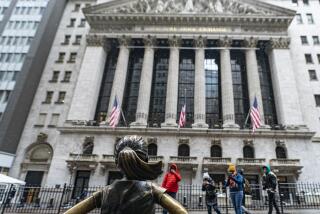Cyclicals Are Back in Favor, but Some More Than Others
- Share via
A good economy isn’t so bad after all, some investors seem to have decided.
While the broad stock market has struggled, or worse, since Friday’s stunning report of brisk U.S. job creation in February, some well-known names have leaped back onto the New York Stock Exchange’s new-highs list, including Chrysler, Deere, Monsanto and United Technologies.
It’s the Revenge of the Cyclicals, the return to favor of heavy-industry firms whose fortunes ebb and flow with the economy. If the business outlook overall is improving, as Friday’s jobs report appeared to suggest, then the industrial giants that produce basic materials or big-ticket machinery should gain as well--or so the logic goes.
The renewed interest in the cyclicals, knee jerk as it may be, has already lifted the Morgan Stanley index of key cyclical stocks 11% this year. In contrast, the broad Standard & Poor’s 500 blue-chip index is clinging to a 3.4% gain.
But if the U.S. economy is going to accelerate, will industrial giants be the biggest beneficiaries? Or are there better ways to invest for a new growth spurt?
*
On the surface, many industrial stocks look cheap. Even at a record $42.125 a share currently, farm machinery titan Deere is priced at just 13.5 times analysts’ consensus earnings per share estimate for 1996. The average blue-chip stock sells for more like 17 times earnings.
True, cyclical stocks usually sell for lower price-to-earnings ratios precisely because their earnings are cyclical (i.e., business is either booming or busting, as opposed to steadily growing). But if February’s employment report means there’s no recession on the horizon, then the cyclical bust in earnings also should be further in the future. Ergo, maybe there’s more life left in the industrial-stock story.
Unfortunately, unlike earlier in this decade when industrial companies’ earnings potential was explosive as the companies restructured and the global economy began to pick up, there is much less agreement today about how much more profit they can squeeze from incremental demand, and about how much more demand there is, period.
Example: On Feb. 29, Merrill Lynch & Co. downgraded major paper stocks, saying paper is in oversupply worldwide relative to demand. Rival brokerage PaineWebber, meanwhile, last Thursday upgraded the paper stocks, arguing that paper demand is likely to rebound sooner than later, and with it the companies’ earnings power.
Even some analysts who have recently urged clients to add more industrial stocks to their portfolios warn that this latest bounce in the stocks could be short-lived. Arnold Kaufman, editor of Standard & Poor’s Outlook investment newsletter in New York, has been recommending more cyclical issues lately, but he says that if the evidence in coming months points to too strong an economic rebound, Wall Street’s view of industrial stocks will quickly turn negative.
“A faster economic expansion could be a shorter expansion,” he notes, because the Federal Reserve Board would probably be inclined to officially quash the recovery with tighter credit. That happened in 1994, and cyclicals suffered.
Some pros who are looking to play a pickup in U.S. economic growth see better opportunities in stocks outside the better-known industrial names. Charles Mayer, manager of the Invesco Industrial Income stock fund in Denver, has loaded up on engineering stocks such as Fluor, oil-field services issues such as Halliburton and merger/restructuring stories such as Lockheed Martin--all of which, he says, have better earnings prospects anyway, which faster economic growth can only help.
Other Wall Streeters view the battered technology sector as a potential beneficiary of a better economy. And retail stocks, while still facing long-term problems because of the country’s glut of stores, could continue to rise if the consumer spends more freely this spring.
Of course, the potential for any economy-sensitive stock group to advance with the economy also will hinge on how high interest rates go--the unfortunate byproduct of faster growth. The stock market has shown in the past that it can ignore higher rates to a point, but not forever. The recent rise in rates has already exposed two groups likely to perform poorly in a stronger growth/higher rate environment: Banks and electric utilities.
(BEGIN TEXT OF INFOBOX / INFOGRAPHIC)
Industrial Strength
The Morgan Stanley index of major cyclical industrial stocks has rocketed this year as investors bet on a drawn-out economic expansion. Quarterly closes for the index, and latest:
1996: 377.53
Source: Bloomberg Business News
More to Read
Inside the business of entertainment
The Wide Shot brings you news, analysis and insights on everything from streaming wars to production — and what it all means for the future.
You may occasionally receive promotional content from the Los Angeles Times.










